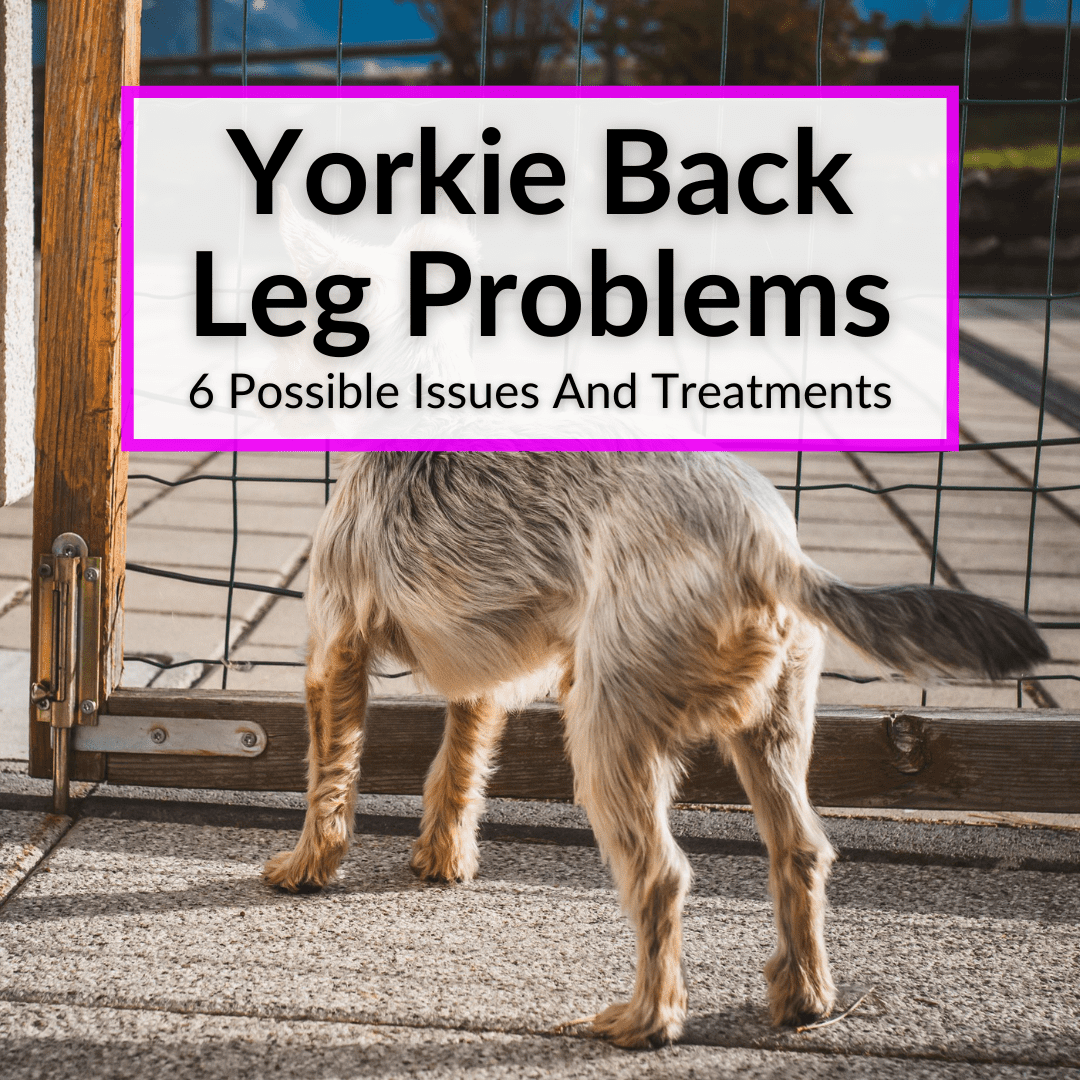
And Yorkshire terriers are no exception.
If you have one in your family, you may have to deal with Yorkie back leg problems at some point in the future.
Or you are already dealing with them and that is why you find yourself here.
There are a few common health issues that can cause a Yorkshire terrier to have problems with its hind legs.
Keep reading for a list of the most common ones, along with possible remedies or treatments. As always, we strongly recommend contacting your vet for any health related issues with your dog.
Contents
Yorkie Back Leg Problems: Possible Issues
A Yorkie’s back leg problems can result in limping, lameness, difficulty in walking and running, loss of balance, and even complete or partial paralysis.
Common causes of black leg problems in Yorkies are patellar luxation, hip dysplasia, and Legg-Calve Perthes disease. Neurological conditions, trauma, anemia, and degenerative conditions can also cause hind leg problems in Yorkshire terriers.

Let’s take a look at the 6 most common causes of Yorkie back leg problems, along with treatment options. As always, please consult your vet before beginning any treatment. We are not medical professionals.
Patella Luxation
This is an inherited condition that affects a Yorkie’s knees in one or both hind legs. The kneecap (also known as the patella) slips in and out, causing affected dogs to bunny-hop or walk with a limping gait.
Luxating Patella is common in small breed dogs like Yorkies. According to the Universities Federation for Animal Welfare almost 26% of Yorkies are affected by patellar luxation.
The treatment for patella luxation depends on the grade or extent of the disease. Mostly, it involves pain medication, physical therapy, and weight management.
Good breeders refrain from breeding Yorkies with patellar luxation. That is why it is important to buy your Yorkie from a reputable breeder.
Legg-Calve-Perthes Disease
Legg-Calve-Perthes Disease (or LCPD) causes a deterioration of the bones of one of the hind legs, causing limping, pain, lameness, and even muscular atrophy. As the disease progresses, the dog may suffer from painful osteoarthritis.
Unfortunately, the Yorkshire Terrier is the one breed that suffers from LCPD the most. It is a progressive disease, which means that the condition can only worsen with time.

The treatment for LCPD includes bed rest, non-steroidal anti-inflammatory medicines, and supplements like chondroitin, glucosamine, and MSM to strengthen the bone and delay the onset of osteoarthritis.
Hip Dysplasia
Hip dysplasia is another inherited condition that affects Yorkie’s back legs. Affected dogs refuse to put pressure on the hind legs. The condition also results in limping or a hopping gait, reluctance to get up from a sleeping or lying position, and a reluctance to climb stairs.
The only treatment for this painful disease is expensive surgery that can cost thousands of dollars. Hip dysplasia is a preventable condition and good breeders always test their breeding Yorkies using OFA tests to ensure that their Yorkie puppies do not inherit it.
Anemia
If a Yorkie has a low red blood cell count, it could develop back leg weakness and the inability to stand or walk. Common causes of anemia in dogs are malnutrition, autoimmune diseases, or blood loss due to an accident or injury.
The good news is that this type of back leg problem is reversible. Once you fix the anemia, your Yorkie should recover and live a healthy life.
Neurological Issues
Spinal cord issues like tumors and intervertebral disc disease (or IVDD) are some neurological issues that can cause back-leg problems in Yorkies.

If your dog has recently started showing signs of weakness in its back legs, it is important to have it checked by a vet. Early diagnosis can help improve the prognosis and management of the condition.
Trauma
Falls, accidents, and getting hit by a car can also cause damage to the legs and nerves, resulting in hind leg problems in Yorkies.
If you suspect that your Yorkshire Terrier is experiencing back leg problems after getting hurt in a traumatic episode, it’s important to take it to a veterinarian for an evaluation. Early diagnosis and treatment can help to manage the condition and improve your dog’s quality of life.
Why Is My Yorkie Limping Suddenly?
Sometimes, limpness may be caused by something as simple as a thorn in the paw. Or it could be serious like bone cancer.
You must pay careful attention to the events leading up to the lameness and limping. Was it too much Frisbee with your Yorkie at the beach over the weekend? Perhaps your pet went swimming and cut its tiny paw with something under the water?
Here are some questions to consider when trying to evaluate a sudden unusual gait in your Yorkie:
- Did the limping come on suddenly? Sudden lameness can indicate dysplasia, arthritis, nutritional deficiencies, or other diseases.
- Where has your Yorkie been? Swimming, exposure to ticks, punctured paws, walking on grass, thorns or stones, etc., can cause sudden limps.
- Has your dog engaged in vigorous activity? If your Yorkie is a couch potato, but you suddenly take it for a weekend filled with long-running, then muscle or tendon soreness could be a cause. If your Yorkie jumped to catch a Frisbee, then a stretched ligament can also cause limping.
You must also try and distinguish between limping and general stiffness. Sometimes it may just be a minor sprain that will resolve after some rest. If, however, your Yorkie has been limping intermittently, then it is essential to have it examined by a vet.
Do Yorkies Have Problems With Their Hips?

Like all small dogs, Yorkies often have issues with their hips. The breed is prone to hip dysplasia and Legg Perthes Calve Disease.
Some of these conditions are preventable, since they are genetic. This is why good breeders conduct tests to ensure that their breeding dogs are cleared for hip dysplasia. This results in healthy puppies.
You must also conduct regular health checks for your Yorkie. That combined with a healthy diet, supplements, and regular exercise could prevent some common hip problems in your dog.
What Causes Sudden Hind Leg Weakness In Dogs?
Several factors can cause sudden hind leg weakness in dogs. We will list the most common ones next.
Trauma Or Injury
Fractures, sprains, torn ligaments, etc. could result in sudden hind leg weakness and limping in dogs.
Neurological Conditions
These include IVDD (or intervertebral disc disease), spinal cord injuries, and tumors on the spinal cord. They can all result in sudden hind leg weakness.
Infections
Bacterial or viral infections can also cause inflammation and back-leg weakness in dogs.

Certain Toxins
Toxins in the environment, like pesticides, household cleaners, certain plants, and even certain medications, can be a cause of hind leg weakness.
Degenerative Issues
Arthritis, degenerative myelopathy, Legg Perthes Calve Disease, hip dysplasia, etc. are some conditions that result in hind leg weakness in dogs. It is best to take your pet to the vet to evaluate the exact cause of sudden back leg problems in your dog.
Hind Leg Issues In Yorkshire Terriers: Final Thoughts
Yorkie back leg problems are not uncommon. There are a number of health problems, both hereditary and not, that can cause issues with a Yorkshire terrier’s hind legs.
The 6 issues above are the most common health problems in yorkies that can result in the dog’s hind legs not working correctly. Unfortunately some of those problems are not curable, but there are treatments to manage the issue and make your pup more comfortable.
Tugay Tosun says
My baby 12 years old. His name is Mickey. He is living in Istanbul city with me and my mom. He had never been sick until now. All of his health checks and vaccinations were completed appropriately right on time. The best doggie food and everything. He cannot walk appropriately. He now started having cross walks on his rear legs. He falls down in a short period of time when he stands up. He cannot behave accordingly with his wishes like walking towards a target he wants to reach. Unfortunately his doctor said there was nothing to do because in x-ray he had some problems in both of his rear legs and some problem also with hip bones. And they were afraid that he was probably going to die if he went through a surgery under narcosis because he was old enough not to resist all this pain and narcosis. And also developmentally his heart was actually unbelievably bigger than a normal animal. As a result I don’t know what to do to save him. He is looking at me staring why he cannot walk the same way he used to before. It’s very painful experience to see him this way the first time in my life having nothing to do. I cannot take him outside of my house for a walk like i always did but he always asks me to take him outside. He is inside all the time. I don’t know how long he will be able to live like that spending all his time inside the house. He is trying to understand what is happening to him because he never knew something like this could happen in life. It’s so bad that he is afraid something is not going the way it’s supposed to be. He starts trembling because he is afraid that he will die. I feel very helpless to do something for Mickey. I just sit down all the day thinking why this happened and how i came up to this point in life with xray results in my hand and trying to understand his psychology and pain he is feeling. And praying all the time
Mike Kelsen says
Thank you for sharing. I’m so sorry to hear that. It’s always so sad when they get old and begin to have more and more health problems that can’t be fixed.
Crys says
Unfortunately my Tonka is going through the same thing and he will not eat. Although I don’t want to but it’s best to not him suffer so I will be sending him to heaven today. It hurts my heart but I can’t make him suffer just so my heart won’t be broken. Hope Micky is not suffering
brenda desper says
I have a yorkie 14 years old. He was diagnosed with spinal issues and not guaranteed to get better. He has lost all access of walking. He was given pain meds but
finished them. I may concern is if he is suffering. Do I need to let him go. Please advise as soon as possible. IF he is in great pain, I have to let him go.
Mike Kelsen says
This is something you should definitely discuss with your vet.